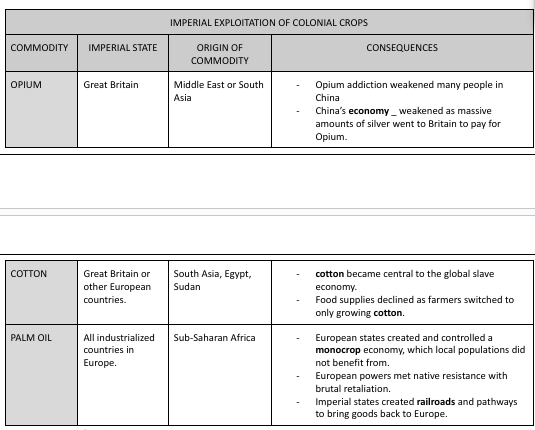AP world 6.5
1/40
Earn XP
Name | Mastery | Learn | Test | Matching | Spaced | Call with Kai |
|---|
No analytics yet
Send a link to your students to track their progress
41 Terms
Opium
important raw material for Great Britain
Sold to the Chinese
Result of the 1st opium wars on china
Chinese lost a lot of trading independence
Describe the shift that took place after industrialization
Influence and power of raw materials sifted from Asia and Latin america to places like Britain, the US, Japan, and France
Economic imperialism
Foreign businesses have great economics power/influence
What resources were exploited?
People, raw materials, refined materials
The East India company was involved in what trade until it ran into opposition from the Dutch?
Spice trade
The EIC came to dominate what world trade?
Textiles
The Dutch East India Company had a monopoly on what?
Trade with Dutch East Indies
Describe the Culture system (make sure to use the words cash crops, culture system, corvee labor)
The culture system meant farmers had to choose between cash crops or corvee labor, compulsory unpaid work
What Chinese goods were in demand?
Porcelain, silk, tea
Why was there a trade imbalance between the British and China?
China wasn’t interested in British goods
How did the British get more profits to buy tea and other Chinese goods?
The EIC forced Indians to grow opium.
Describe the events of the first opium war
The EIC sold opium to china in exchange for silver, getting many addicted to it
The chinese emperor criminalized its use in 1792 with no effect
The chinese objection to opium led to the first opium war
The chinese seized he british warehouse for opium in Canton
British warships destroyed the chinese blockade that kept ships from Canton
The british captured canton and finally capture Nanking
The treaty of Nanking resulted in
China being forced to open up 4 more posts to foreigners
Cede hong kong to britain
Forced the chinese to pay damages
Forced them to allow free trade
What caused the 2nd opium war
The treaty of Nanking didn’t satisfy Britain or China
Britain wanted opium legalized
China were unhappy about their exploitation
Chinese officers boarded a british trading ship, lowered the flag, and arrested some chinese officers in 1856
The treaty of Tientsin resulted in
Allowed foreign envoys to reside in Beijing
Opened more new ports to western trade
Allowed the free movement of christian missionaries
Opium was legalized
China ceded the southern portion of the Kowloon peninsula
Which countries wanted to be included in Chinese trade?
Japan, France, Germany, Russia , US
Spheres of influence
Areas where foreign countries had trading rights
What is the US proposed Open Door Policy?
A system of trade in which China was open to all countries equally to prevent total control by one power
What caused the unequal trade structure in Africa, and what was its effect?
The land originally meant for growing food was converted to cash crop production after colonization. The colonies were now economically dependent on foreign powers.
Why were Africans vulnerable during times of brought?
They now relied on a single cash crop
Why did food shortages begin to arise in Africa?
Food production declined as cash crops took priority
Where did cotton become a cash crop at this time?
Sudan
Uganda
Kenya
In Kenya, native people were moved off of their land so white settlers could farm cash-crops. What were African farmers forbidden to do?
Participate in the growing or exportation of cash crops
What was the major cash crop of the Gold Coast?
Cocoa
Even after the British outlawed slavery, which colonial power continued to capture and trade slaves?
France
Slave labor was used to make many cash crops, especially which three?
Oil palms, coffee, cocoa
Redraw the table

Europe and the US were looking for the following three things in Latin America
raw materials
low wage labor
new markets
The US was heavily invested in
Mexico and Cuba
US investment supported infrastructure and industry in Latin America, especially
railways
shipping
emerging banking and financial sectors
Great Britain invested more money in ______ than its own colony of India. What did they do?
Argentina
Improved breeding stock, developed large scale farming through pampas
Financed infrastructure and building (telegraph and railroads)
Built a new port for trade called Port Puerto Madera
Chile’s economic development was initially dependent on
Export of agricultural produce
The wealth of Chile brought about
dependency on Spain
tensions among neighboring states
What was the dominant export of Chile?
Copper
Why did the Rubber industry decline in Brazil?
Rubber was grown in malaysia at a lower cost
What did this shift show?
Trade was organized to benefit companies in Britain and the US
How did companies like the United Fruit Company pressure governments (and why)?
It allied with large landowners to maintain favorable conditions for the US
Banana Republic
Small, central American countries under the economic power of foreign companies
they were politically unstable and relied on the exportation of limited resources like minerals and bananas
What was the result of Economic Imperialism in Hawaii?
Hawaii overthrew the constitutional monarchy, hoping to be annexed by the US. It was declared US territory in 1898.